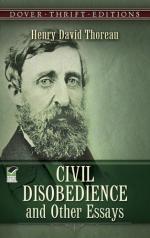
|
| Name: _________________________ | Period: ___________________ |
This test consists of 15 multiple choice questions and 5 short answer questions.
Multiple Choice Questions
1. What did Thoreau say ruined the earth?
(a) Cultivation of the earth.
(b) Social standards.
(c) Industry.
(d) Expansion.
2. What did Thoreau praise most about Brown?
(a) His willingness to risk his life.
(b) His ability to gather followers.
(c) His boldness.
(d) His unwavering spirit.
3. What did Thoreau say Nature would reveal to man?
(a) Designs.
(b) Ideas.
(c) Thoughts.
(d) Needs.
4. What did Thoreau say he was grateful to not have to worry about while walking?
(a) Trespassing.
(b) Entertaining others.
(c) Stumbling.
(d) Being alone.
5. What direction did Thoreau say most men tended to walk in when given the chance?
(a) North.
(b) East.
(c) West.
(d) South.
6. What word does Thoreau use to describe his walks?
(a) Liberating.
(b) Exhilerating.
(c) Relaxing.
(d) Quanitfying.
7. What did Thoreau say most people were trying to do to nature?
(a) Make it un-natural.
(b) Make it orderly.
(c) Make it obedient.
(d) Make it beauitful.
8. What attribute did Thoreau say never came out on one of his walks?
(a) Excitement.
(b) Endurance.
(c) Practicality.
(d) Patience.
9. What did Thoreau compare what Nature revealed to man to?
(a) Sunshine.
(b) Wind.
(c) Growth.
(d) Rain.
10. How many men followed Brown in his attack?
(a) 11.
(b) 21.
(c) 31.
(d) 41.
11. What was illegal in Massachusetts?
(a) Returning slaves to their rightful owners.
(b) Slavery.
(c) Printing without permission.
(d) Objecting the popular opinion.
12. What did Thoreau dislike about the newspaper articles about Brown's attack?
(a) They made him out to be a hero.
(b) They did not give both sides of the debate.
(c) They did not quote Brown himself.
(d) They misread his intentions.
13. What image does Thoreau use to show the power of walking?
(a) The Colonies.
(b) The Globe.
(c) The West.
(d) The Flag.
14. Where did Thoreau deliver his speech about Brown?
(a) Concord.
(b) Philadelphia.
(c) Washington D.C.
(d) Boston.
15. What kind of man did Thoreau think Brown was?
(a) Foolish.
(b) Religious.
(c) Up-front.
(d) Brave.
Short Answer Questions
1. How long every day would Thoreau spend walking?
2. How did Brown come to have a trial?
3. Where did Thoreau say men should get their guidance and direction from?
4. What did Thoreau say his walking was a metaphor of?
5. What was Thoreau pleading for in his speech about John Brown?
|
This section contains 381 words (approx. 2 pages at 300 words per page) |

|




